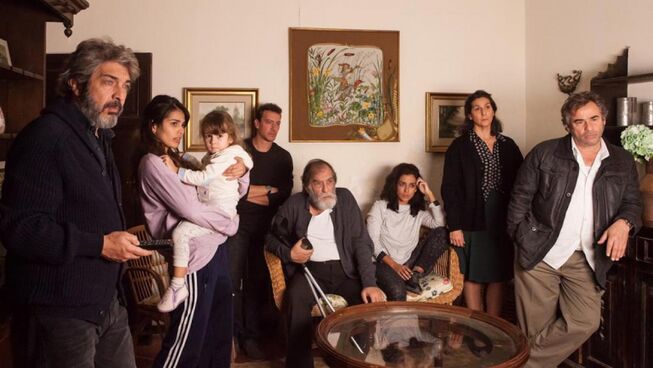
3 out of 5 stars
It can be tricky when filmmakers make a film about the filmmaking process. There is usually an element of self-deprecation involved, yet things can seem self-serving if done wrong. What can help in this process is to go with some of the biggest stars in international cinema to make it convincing. That is precisely what Argentinian directors Gastón Duprat and Mariano Cohn have managed to do. They were able to get Antonio Banderas (Uncharted), Penélope Cruz (Parallel Mothers), and Oscar Martínez (Live Twice, Live Once) on board for this satirical take on the making of motion pictures.
When pharmaceutical tycoon Humberto Suárez (José Luis Gómez) ponders his existence and legacy, he has to decide whether to donate money for a bridge or fund the next great cinematic project. After some consideration with his assistant, the multimillionaire acquires the rights to a contemporary, award-winning novel as a possible film screenplay. The story involves two brothers who struggle to forgive one another after the death of their parents. Suarez hires the celebrated and eccentric director, Lola Cuevas (Cruz), to translate the book for the big screen. Since it primarily involves two compelling characters, she hires two of the world's most renowned actors. Iván Torres (Martinez) is a legendary thespian who continually refines his craft. At the same time, Félix Rivero (Banderos) is a celebrity actor who relies on fame to get him through the process. There should be no surprise that the two men despise one another, which makes for many tensions and comedic situations.
This Spanish-Argentine collaboration is a perfect example of the use of triangulation to deliver this dark comedy. Even though the whole fictional project is initiated by a billionaire’s need to justify his existence, the power of the film is found in the three main leads. Each actor commits to their role and manages to make this believable while showing the absurdity that can exist within the creative process. From Cruz’s bizarre techniques to the varied methodologies of the acting craft portrayed by Martinez and Banderos, it is a wonder that any film manages to get made. This process moves between the comedic and the dramatic effortlessly while keeping the audience holding on to see how things will all play out.
As is the tradition with most Spanish films, the screenplay's setting and tone remain on the darker side of life. The rehearsal location and the dialogue both inhibit the shadows of this production and little changes as it moves towards the shocking conclusion. If the audience can embrace the satirical and vicious nature of the dialogue, the ride will be an entertaining experience. This tale will entertain and challenge how the viewer thinks about morality and human interactions. Yet, the greatest struggle may be connecting with any of the characters since none of them proves to have any appealing attributes, despite their obvious talents. Official Competition is ideally suited for those who enjoy delving into the darker side of humanity and hope to laugh at the expense of others' tragic failings while considering how this applies to real life.
REEL DIALOGUE: What determines your moral centre?
Ethics. Morals. Career. Justification. If allowed the opportunity to act in any way that you lie towards others, would you take the chance?
Official Competition takes a magnifying glass to the ethical and moral implications of the film industry. Still, the real issue is watching as all involved try to justify their decisions. The back and forth between the three main lead actors shows how far people are willing to go to paint themselves in a positive light. Also, they would be willing to sacrifice their moral code to further their careers. It exposes a portion of human nature that shows that when people get engrossed in their sin, justification becomes the method of convincing themselves that they can do it. Come on, everyone else is supposedly doing it, right? A vicious cycle that never leads to good results in the end.
How do you determine your moral code? Where would you draw the line and why?
Do not be deceived: “Bad company ruins good morals.” - 1 Corinthians 15:33






